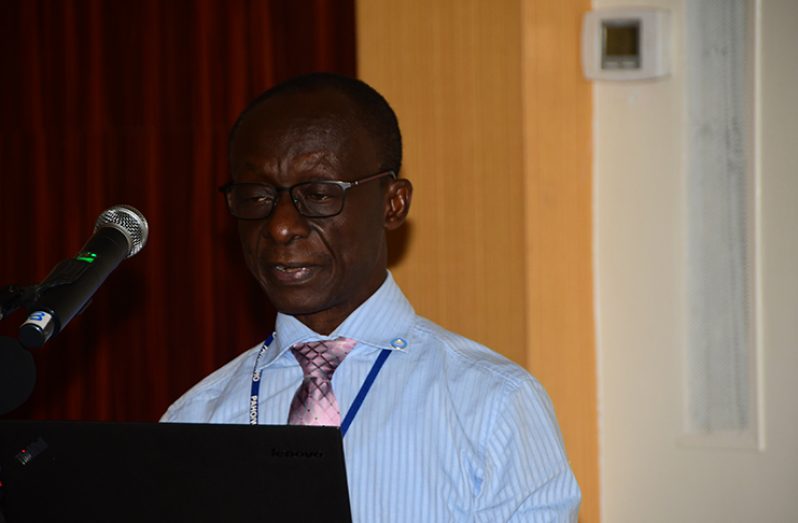…gov’t, PAHO renew efforts to stop importation of fake, substandard drugs
THE Pan American Health Organisation (PAHO), the World Health Organisation (WHO) and the Ministry of Public Health (MoPH) are currently working with the Government Analyst Food and Drug Department (GA-FDD) to strengthen its regulatory systems to prevent importation of substandard and falsified (SF) medications.
In their quest to strengthen regulatory systems guiding operations of the Food and Drug Department, a stakeholders’ consultation was held on Tuesday at the Pegasus Hotel. Registration Practices for Medicines and Biologics, Pharmacovigilance and Post-Market Surveillance Practices and Best Practices in licensing of establishments were among the topics discussed on Tuesday.

PAHO/WHO Representative Dr William Adu-Krow said health regulation is regarded as one of public health’s basic functions. “Effective regulation of medicines promotes and protects the public’s health by guaranteeing medicines’ quality, safety, and efficacy; promoting the adequate manufacture, storage, and distribution of medicines; facilitating the fight against substandard, spurious, falsely labelled, falsified, or counterfeit medical products; providing the necessary information to health professionals and patients so they can use medicines rationally; and ensuring that access to medicines is not hindered by inefficient regulatory frameworks. Developing a strong national regulatory system is, therefore, a critical component of a national health system,” Dr Adu-Krow explained.
He said PAHO/WHO has been supportive of the Caribbean Public Health Agency (CARPHA) in its push to regulate the regional health sector through the Caribbean Regulatory System (CRS). Through that, the CRS helps member states to assess medicines for legal sale in the market based on safety, quality and efficacy. Additionally, it monitors medicines for safety and quality when in use in the market.
In the case of Guyana, it has signed a Memorandum of Understanding (MoU) with the CRS permitting medicines to be submitted to CARPHA for review and recommendation for marketing authorisation, that is, registration or approval. Under this agreement, Guyana will also receive assistance with post-market surveillance activities.
“Guyana’s law stipulates that an imported product must have prior approval in one of only four regulatory authorities (Australia, Canada, UK, and the U.S.), in order to be registered. The CRS pathway also requires that a reference authority grants prior approval, but it expands the list to the following: Argentina, Brazil, Canada, Chile, Colombia, the European Union, Mexico, UK, the U.S., WHO Prequalification—and creates an accelerated pathway to market for those products that can demonstrate they are the same as those approved in one of these reference authorities,” Dr Adu-Krow explained.
Applauding the Food and Drug Department and by extension the government on their decision to buy into CSR, the PAHO/WHO Representative said at a time when resources remain limited, they cannot do everything and have energetically embraced the CRS mechanism; the use of the regional system will lighten the load.

Food and Drug Department (GA-FDD),
Marlon Cole
Director of the Food and Drug Department, Marlon Cole, told the stakeholders that though the Food and Drug Act was in place, the registration requirement for the importation of pharmaceuticals and medical supplies was not enforced in 2014. Enforcement commenced mid-2014 and into 2015. He said it was generally observed that many importers were unable to satisfy basic regulator requirements. Though there have been some improvements, meeting the basic requirements remains a challenge for some importers.
Guyana signed on to the MoU in January 2017, and became the first country to register a CRS- recommended drug. Since then to now, the country, through the Food and Drug Department has registered 15 CRS-recommended drugs.
He noted too that Guyana has been utilising the CARPHA’s Medicine Quality Control and Surveillance Department to test samples, and the results have not been favourable. He explained that there are several cases in which the drugs do not meet the required standard.
“These are drugs that we would have taken off of our local market and submit to the Drug Testing Laboratory in Jamaica and these are the results,” Cole told the stakeholders.
However, it is believed that the steps being taken to strengthen the regulatory system will help to prevent the illegal importation of substandard and falsified (SF) medications.
Dr Patrice Douglas, Technical Assistant at the Public Health Ministry, who addressed the forum on behalf of Public Health Minister Volda Lawrence, said despite many challenges and limitations, the Food and Drug Department has been actively enforcing provisions of the laws of Guyana Food and Drug Act, Chapter 34:03 and its accompanying Food and Drug Regulations of 1977. Dr Douglas alluded to the fact that as recent as 2014 registration requirements for the importation of pharmaceuticals were not enforced; like the Director of the Food and Drug Department, Dr Douglas chronicled the steps taken to date to ensure that safe, efficacious pharmaceuticals and medical supplies meet the local market.
Globally, it is reported that one in 10 drugs released for sale is Substandard or Falsified (SF). Here in Guyana, the statistics of SF Drugs are unknown; this, according to Dr Douglas, is a cause for concern. Notwithstanding this, she said the Food and Drug Department continues to chart the way forward.
“The GA- FDD has also created a system of Pharmacovigilance (PV) to monitor drugs even after they are released in the market and has also officially joined the Uppsala – global body for PV. In addition, the GA-FDD is working closely with the CARPHA’s Medicine Quality Control Surveillance Department (MQCSD) Lab based in Jamaica. Sample submissions of pharmaceuticals from the local market to this Lab are ongoing and preliminary results on the quality of medications on our local market are not encouraging,” she posited.
Remuneration packages for drug inspectors have been modified, and as of Tuesday, the department secured four new drug inspectors to strengthen its regulatory oversight and to build capacity. The Public Health Ministry is also in the process of relocating the department into its own building and is exploring the possibility of revising the legislation.




.png)









